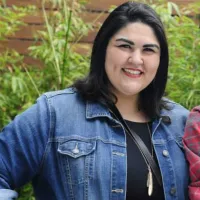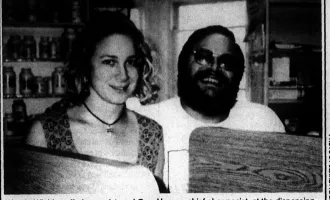A Champion For Women in Science
With a background spanning everything from philosophy to botany to structural biology, Dr. SeemayChou joined the UCSF Department of Biochemistry & Biophysics as an Assistant Professor to study mechanisms of host-microbe interactions in 2016.
The following is a lightly edited transcript from an interview with Dr. Seemay Chou detailing her journey to the laboratory, her passion for supporting the advancement of women in science, and her take on the role of scientists as citizens in today’s political climate.
As a kid, was there ever a dream career that you saw yourself doing when you got older?
From 2nd grade to about 5th grade, I was obsessed with being a real estate agent! I would rollerblade to open houses to pick up the blueprints and learn all about it. I think part of it was that, when you’re little and you go to an open house, the real estate agent is the most popular person in the room: they are well-dressed, they are the ones everybody is trying to talk to, and they have all the information. I know that’s not a really inspiring science story, but I honestly never saw myself as a scientist. However, I was always a very curious kid and my interests would jump around a lot. That’s probably intrinsic to being a scientist — curiosity, right?
Of course! Was there a specific experience that led you to be interested in science as a career?
I was always really interested in my philosophy Logic courses. Then I had to take a summer course to get my Biology requirement out of the way. The professor, Stan Roux at UT Austin, was very engaging and really applied a lot of the rules of logic when he was walking us through primary experiments to explain the science. I was very curious about what doing physical science was like, so I just went up to him after class and asked if there were any opportunities in his lab. I started that summer in his Botany lab, and I found it really engaging because it was a physical way to apply the logic I had learned in philosophy to an actual experiment.
Your lab focuses on animal-microbe interactions, which is different from where you started with Dr. Roux in plant biology. Can you tell me a little bit about that journey?
As a graduate student, I actually joined a structural biology lab. We were using X-ray crystallography to study interactions at the host-microbe interface. From that experience, I learned that I really like to get all the way down to the mechanism, even to the atomic level. However, I’m most motivated by questions. I’ve jumped around from technique to technique and I’ve realized that ‘technique’ is often something you can learn. So you don’t necessarily need to feel constrained by a specific approach. Ultimately, it is always about the question.
Now as an Assistant Professor, is there anything about the faculty experience that has been surprising or unexpected to you?
We as researchers have a very strange career path where your bread and butter to get to this position is a specific set of things: doing science in the lab and publishing papers. That’s pretty much it. Then, all of a sudden, you arrive at this faculty position and you’re in charge of administrative duties, teaching, motivating people in the lab, trying to figure out how to design projects, and thinking about the futures of the people in your lab. There are so many directions that your brain is going in at once. That was unexpected to me.
The other thing that surprised me was walking into my first faculty meeting: the gender skew was really evident. From reading the numbers, we have pretty even gender ratios as grad students and as postdocs. Then, you reach this point of your career and there is a really sudden drop. That is a little bit jarring to see. In my first few months, I became really passionate about gender equity — more than I had in the past because I had never actually seen it with my eyes.
You made a great point about how representation of women in the STEM training pipeline has steadily increased over the years, yet women are still underrepresented at the leadership level. What are your thoughts about the future of women in science? What work is left to do?
Increasing representation is definitely a huge task for us. I’ve been working with the Office of Career and Professional Development to look at this exact issue. One thing that I read a few years ago, that I really think is true, is that women tend to anticipate failure more than men do. That anticipation motivates women to drop out of the game before they are even forced to drop out. We are losing a lot of talent early on because people just don’t have enough examples of success around them to think that it’s a good bet. I think that is going to change over time as we have more women in science.
One of the really exciting things for me right now is that I am very connected to a lot of women postdocs on the job market. We’re trying to help each other and help the next wave of women: help them negotiate, help them get the job they want. We’ve all heard of the “Old Boys’ Club.” That isn’t necessarily a bad thing, but I think we also really need to develop a new “Women’s Club” that sort of is the counter to that. What we really want to build is a network of women that support each other.
Switching gears just a bit to comment on today’s political climate — science has reached center stage. How do you think that impacts our roles as not only researchers but also as citizens?
As scientists, our job is to seek truth. We’re in a political climate right now where that process in itself is in question. Sometimes as scientists we try to be apolitical, to just focus on our work and let the politicians figure it out. However, today’s climate is now a problem that extends beyond scientists: we’re realizing that every citizen has a role and we can’t just sit back and wait for someone to represent us. It’s been really encouraging to see my colleagues consider running for office, like Mike Eisen at UC Berkeley who is considering a run for U.S. Senate.
I think another big challenge facing us right now is that there is a huge divide in our society with a fraction that intrinsically does not trust science or scientists. Part of it is because we don’t speak the same language. Our education backgrounds are very different, so I can’t just go into a bar and tell someone about molecular biology — we just don’t have a common language to be able to have that conversation. So, I think the simplest thing we can do is try to find ways to interface with our community, to talk about our science in a way that is not alienating.
Francesca Aloisio is a PhD student in the Biomedical Sciences program studying early embryonic stem cell differentiation.


